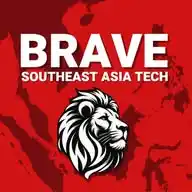
BRAVE Southeast Asia Tech Podcast
36 subscribers
About BRAVE Southeast Asia Tech Podcast
Learn from Southeast Asia’s best tech leaders. Build the future, learn from our past & stay human in between. No B.S on success. Southeast Asia's #1 startup & venture capital podcast with 13,000+ subscribers. New episodes every Monday & Thursday across Singapore, Indonesia, Vietnam, Thailand, Malaysia & the Philippines. Learn more at www.bravesea.com
Similar Channels
Swipe to see more
Posts

Here’s your weekday BRAVE Southeast Asia tech insight! Jeremy Au referenced Asia Partners’ report predicting a surge in Southeast Asian unicorns based on macroeconomic fundamentals, and discussed the GDP per capita “time machine” phenomenon where Chinese and American founders enter Southeast Asia to replicate proven business models in frontier markets. He also shared an LP’s perspective on Southeast Asia's underperforming VC funds, questioning whether it was due to fund selection or broader market dynamics, e.g. Vietnam’s struggle to produce a successful tech IPO and high U.S. interest rates that have constrained regional Series B/C capital. He compared VCs to Olympic coaches, explaining that top investors prioritize 10x teams, product, and defensible economics—but competition is fierce for the best startup teams, e.g. Rewind AI receiving 170 term sheets via a Google form auction as an extreme case of a bidding war where VCs fight to get into the round. Watch, listen or read the full insight at https://www.bravesea.com/blog/gdp-per-capita-time-machine Please forward this message or invite friends at https://whatsapp.com/channel/0029VakR55X6BIElUEvkN02e

Here’s your weekday BRAVE Southeast Asia tech insight! JingJing Zhong, the Co-founder and CEO of Superbench and Jeremy Au discussed: AI Impact on Service Businesses: JingJing explained how AI advancements have transformed traditional service industries. Previously, AI struggled with logic and calculations, making it unreliable for tasks like generating service quotes. Now, improved reasoning allows AI to think through multi-step processes, reducing human workload and increasing efficiency. Superbench helps businesses like cleaning and plumbing services scale without needing more employees. She shared how her former company, Helpling, reduced its sales team from five agents to one while increasing conversion rates from 30% to 70%. CRM vs. RAG Reality: JingJing pointed out that traditional CRM systems don't integrate well with AI-driven customer support. She introduced Retrieval-Augmented Generation (RAG) as a way to improve AI accuracy by linking responses to verified business knowledge before generating answers. Many AI chatbots still struggle with anything beyond FAQs and simple transactions, particularly in handling complaints. She predicts AI will advance even faster in the next two years, further reshaping service industries. Customers now assume AI agents are human because AI responses feel more natural than scripted templates used by actual employees. Founder Productivity Lifestyle: JingJing reflected on how managing stress as a founder led her to restructure her daily habits. She quit alcohol, shifted to a healthier diet with more vegetarian meals, and committed to consistent journaling. She noted that these changes had a direct impact on her business performance, saying that after quitting alcohol, her sales "went crazy." She emphasized the importance of therapy for founders, citing YC President Gary Tan’s advice: “Do therapy before you start a company.” She believes founders should address their fears and anxieties early to avoid making poor decisions under pressure. Jeremy and JingJing also talked about startup fraud cases like eFishery, the effects of investor ghosting in Southeast Asia, and cultural differences in venture capital practices between the U.S. and Southeast Asia. Watch, listen or read the full insight at https://www.bravesea.com/blog/jingjing-zhong2 Please forward this message or invite friends at https://whatsapp.com/channel/0029VakR55X6BIElUEvkN02e

Here’s your weekday BRAVE Southeast Asia tech insight! Jeremy Au and Gita Sjahrir discussed: 1. Indonesia eFishery Unicorn Scandal Q&A: Jeremy and Gita analyzed the fraud involving eFishery’s co-founders, including Gibran Chuzaefah, who allegedly falsified financial statements to show $750 million in revenue for the first nine months of 2024, when actual revenue was only $157 million. They also fabricated metrics, such as reporting 400,000 active fish feeders, though only 25,000 were verified. The fraud hid over $35 million in losses, falsely portraying profitability and attracting high-profile investors like Temasek and SoftBank. Gita highlighted that the damage was not limited to eFishery, as the scandal undermined investor confidence in Indonesia’s agritech and broader startup ecosystem. A listener argued that many investors lacked an understanding of agritech’s technical and hyper-local challenges, leading them to misjudge risks. Jeremy agreed, pointing out that the scandal is reshaping how international investors view the region, with many pausing future investments. 2. Fraud, Due Diligence & Governance Failures: The discussion explored how due diligence failures allowed the fraud to go undetected through several funding rounds, despite the involvement of seasoned investors. Gita noted that the lack of on-the-ground validation—such as direct visits to rural fish farms and checks on vendors—created blind spots. Fraudulent activities, including round-tripping funds through multiple shell companies, could have been caught with stronger local diligence. Jeremy dismissed this as unlikely, explaining that the inflated metrics were so extreme that many investors were likely unaware until whistleblowers raised the alarm. Both agreed that hiring and training local talent, along with a focus on hyper-local checks, are critical to preventing future scandals. 3. Toxic Founder Pressure & Temptations: Jeremy and Gita discussed how the pressure to achieve unicorn status creates dangerous incentives for founders. The inflated valuation of eFishery, which had raised hundreds of millions of dollars, pushed its founders into unsustainable growth strategies and ultimately fraudulent behavior. Gita explained that many founders, particularly younger ones, struggle to handle large amounts of funding and the accompanying expectations. Jeremy reflected on his own early startup experiences and how founders often conflate their personal worth with their company’s success. He emphasized the need for emotional resilience, disciplined governance, and mentorship to help founders navigate the pressures of high-growth environments. Watch, listen or read the full insight including the role of whistleblowers and internal audits in uncovering the fraud, media investigations led by DealStreetAsia that brought the scandal to light, the failures of Series A and B investors to identify risks during early funding rounds, Indonesia’s evolving legal framework and how it could impact future cases, and advice for agritech founders to prioritize profitability and operational transparency to rebuild trust with investors at https://www.bravesea.com/blog/efishery-scandal-qa Please forward this message or invite friends at https://whatsapp.com/channel/0029VakR55X6BIElUEvkN02e

Here’s your weekday BRAVE Southeast Asia tech insight! Jeremy Au explored the intricacies of understanding customer personas and the challenges of market research. He emphasized the importance of creating nuanced personas for effective marketing, distinguishing them from harmful stereotypes by grounding them in real customer behaviors and needs. He shared insights on the pitfalls of traditional survey methods, particularly how timing and context can lead to inaccurate data, as seen in an example where sober participants misrepresented their preferences for draft beer. Jeremy also analyzed the economic mechanics of customer lifetime value, citing a Southeast Asian SaaS company that generated $100,000 per customer lifetime by charging $1,000 monthly with a 75% margin and a 10-year average retention. Additionally, he discussed Disney's long-term marketing strategy to cultivate lifetime loyalty across generations, contrasting it with the scarcity-driven luxury branding of Hermès and its Birkin bags. Watch, listen or read the full insight at https://www.bravesea.com/blog/marketing-personas-loyalty Please forward this message or invite friends at https://whatsapp.com/channel/0029VakR55X6BIElUEvkN02e













